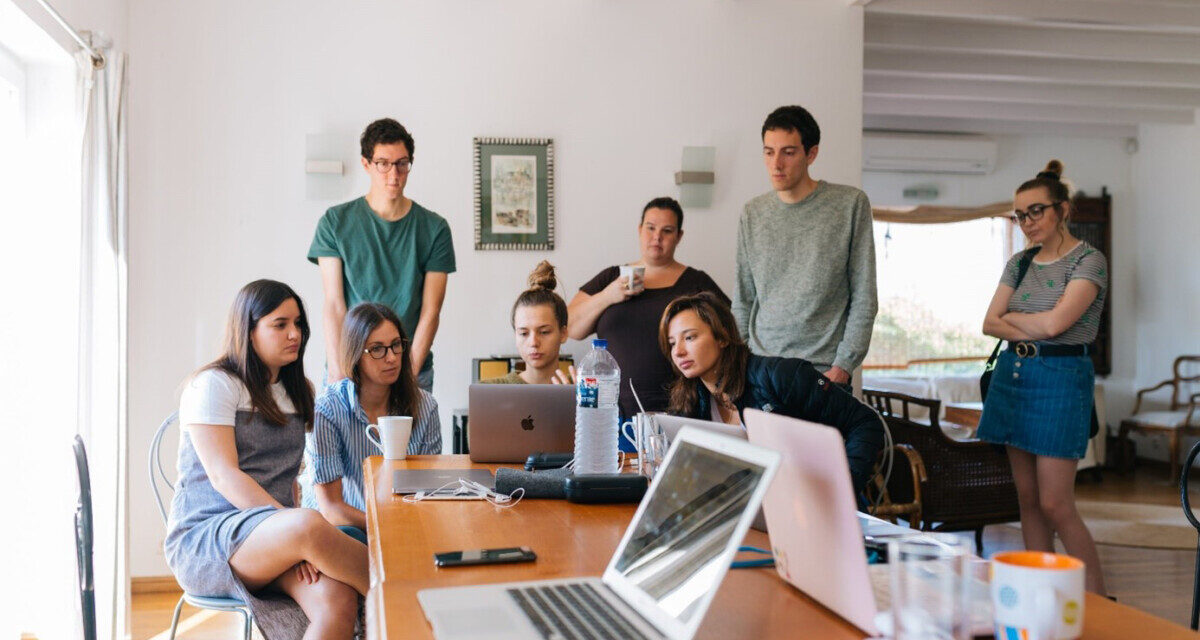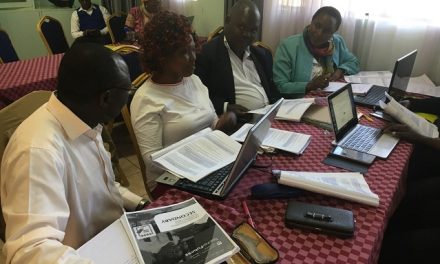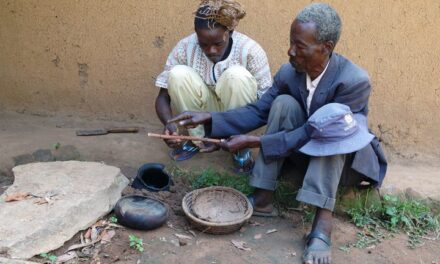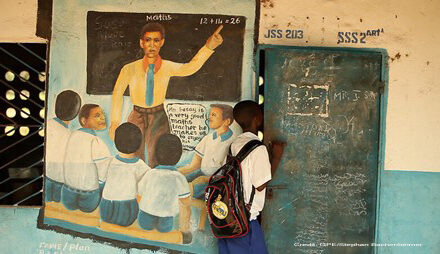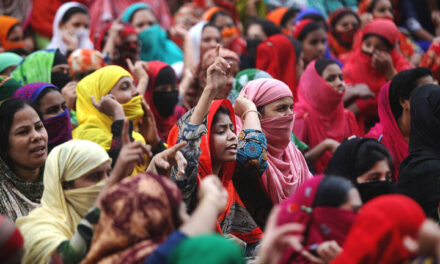This blog was written by Rachel Bowden and Denise Hornig, TU Dresden University of Technology, the Centre of Teacher Education and Education Research.
Fires raged around the world this year, a symptom of human-induced climate change and, in France, a symptom of anger at the unlawful killing of a French teenager of Algerian descent. Both climate change and structural racism stem from extractive and exploitative capitalist/colonial ideologies, which emerged from Europe and continue to fuel unsustainable beliefs and practices in Europe and around the world. Education offers hope for learning ways out of current crises, but is also heavily implicated in unsustainable beliefs and practices. Acknowledging injustice and acting to improve educational equity are necessary for transformation in education, and wider society.
In this blog we share activities developed with student teachers, teachers and teacher educators from across Europe, through online, hybrid and face to face events, as part of an Erasmus+ Teacher Academy ‘Teaching Sustainability’. Through these activities, participants explored the connections between (un)sustainability, linguistic and cultural diversity and discrimination in education, and strategies for making education more just and inclusive. The activities will be published, along with others from the project, as Open Educational Resources in early 2024.
Linguistic diversity and sustainability
The idea that single, separate standard languages exist and are required for full national membership and national and psychological unity emerged in Europe, and has been exported around the world through colonisation. Participants in our blended learning Active Learning Event ‘sustainability and me’, explored the connections between language ideologies, linguistic diversity and (un) sustainability. We contrasted the ‘monoglossic’ notion of single, standard languages with pyscho- and socio-linguistic studies indicating that the majority of the worlds’ people’s linguistic repertoires span standard language boundaries. Participants created plurilingual ‘me maps’, showing their own holistic language biographies. We explored functional approaches to language in education, which allow us to differentiate between language terms, texts and communicative competences as the goal of learning, and language as our main pedagogical tool for interaction, participation and meaning making. We considered how monolingual classrooms and schools dis-able multilingual learners, and identified strategies for enabling learners to draw on their full linguistic repertoires for learning.
Where do you stand on sustainability?
Diverse perspectives regarding sustainability problems, possible solutions and the role of education for sustainable futures are evident in the media, in official reports and school curricula and textbooks. For example, narratives around growth and technological innovation; human rights; capabilities and social justice; environmental synergy; and decolonisation represent related, overlapping and contradictory understandings. In this activity, participants positioned themselves in the room to show the extent to which they agree or disagree with each narrative. Once in place, they discussed their views with people around them and in different positions. The activity fosters critical consideration of sustainability narratives and the definition of personal positions. Rather than deciding which discourse is correct, it exemplifies the value of diverse perspectives for complex issues, such as sustainability, and the generative potential of dialogue between them[i].
Which identities matter?
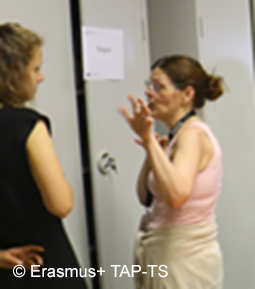 This activity began by exploring the meanings of terms such as: gender, age, race, ethnicity, migration status, socio-economic status, and (dis)ability with participants, drawing on their diverse, international perspectives. Next, we asked participants to discuss which aspects of their identity are most important to them in particular situations, for example: as school children, as students, as teachers; at home, in their local neighbourhood, at work and in shops. The discussion highlighted the contested and constructed nature of identity categories and terms, the differences between terms used (and not used) in different countries, and the ways in which different aspects of identity may be claimed and ascribed in different social situations[ii].
This activity began by exploring the meanings of terms such as: gender, age, race, ethnicity, migration status, socio-economic status, and (dis)ability with participants, drawing on their diverse, international perspectives. Next, we asked participants to discuss which aspects of their identity are most important to them in particular situations, for example: as school children, as students, as teachers; at home, in their local neighbourhood, at work and in shops. The discussion highlighted the contested and constructed nature of identity categories and terms, the differences between terms used (and not used) in different countries, and the ways in which different aspects of identity may be claimed and ascribed in different social situations[ii].
Discrimination in education
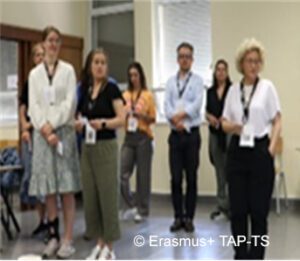 Education can dis-able individual learners in intersecting ways, which may be invisible to teachers. In this activity, participants took on the role of school students, including various aspects of identity (e.g. gender, age, race, ethnicity, migration status, socio-economic status, and (dis)ability. Their goal was to progress through education, by stepping forward if they could answer ‘yes’ in response to particular statements. For example: ‘You see, hear and use your language/s at school’; ‘you celebrate important festivals from your culture/community at school’; ‘your family understand what is expected of them from the school’; ‘You learn about people you identify with at school’; and ‘you identify with teachers at your school’. At each step, participants discussed what was enabling them to progress, or holding them back. Finally, participants identified actions they could take as educators to counter discrimination.
Education can dis-able individual learners in intersecting ways, which may be invisible to teachers. In this activity, participants took on the role of school students, including various aspects of identity (e.g. gender, age, race, ethnicity, migration status, socio-economic status, and (dis)ability. Their goal was to progress through education, by stepping forward if they could answer ‘yes’ in response to particular statements. For example: ‘You see, hear and use your language/s at school’; ‘you celebrate important festivals from your culture/community at school’; ‘your family understand what is expected of them from the school’; ‘You learn about people you identify with at school’; and ‘you identify with teachers at your school’. At each step, participants discussed what was enabling them to progress, or holding them back. Finally, participants identified actions they could take as educators to counter discrimination.
The transition to more just and sustainable futures demands a fundamental transformation of dominant ways of seeing, thinking and acting in the world, and of power hierarchies. Improving educational equity is key to increasing the diversity of knowledge, skills and epistemologies in our education systems and wider society. As Rhiana Gun-Wright powerfully argues:
“Why would a crisis this enormous require anything other than a broad set of people and perspectives? What makes us think that anything less is wise?” (Gunn-Wright, 2023).
Positionality
We are white educators working within a European university. As such, we are part of the problems we partially see and attempt to address, and our work is imperfect and limited.
[i] This activity was adapted from: Tikly, L. (2023) Decolonizing Education for Sustainable Futures: Some Conceptual Starting Points, in: Hutchinson, Y.; Cortez Ochoa, A.A.; Paulson, J.; and Tikly, L.
[ii] This activity was adapted from the ‘personal identity wheel’, an inclusive teaching resource from the University of Michigan. Available to download here: https://sites.lsa.umich.edu/inclusive-teaching/social-identity-wheel/
 |
 |

